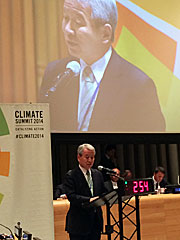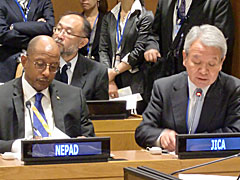Deciding on initiatives to promote sustainable cities
On Sept. 23, at Climate Summit 2014, Tanaka appeared in a discussion of low-carbon urban development that is resilient to climate change. As the heads of major local governments around the world, including the governor of California, the mayor of Seoul and the mayor of Paris, declared their resolve to reduce greenhouse gas emissions and to defeat climate change and announced measures to achieve the resolution, Tanaka talked from the standpoint of a development assistance institution that supports initiatives of developing countries and cities. He spoke about the activities of JICA itself centered on funding, policy assistance and capacity building and about JICA's cooperation with other agencies through the International Development Finance Club (1), to which JICA belongs. He also announced JICA's participation in the Cities Climate Finance Leadership Alliance (2), a new initiative organized at this summit.

JICA President Akihiko Tanaka talks about the importance of sustainable urban development.
The importance of infrastructure development in Africa

JICA promises to continue supporting efforts for infrastructure development in Africa.
On Sept. 24, Tanaka attended a meeting hosted by Japanese Prime Minister Shinzo Abe related to infrastructure development in Africa. The president of Ghana, the prime minister of Ethiopia and other participating representatives of the chair countries of Regional Economic Communities voiced their opinions on the challenges of infrastructure in Africa. As the last speaker, Tanaka touched on the following JICA initiatives: 1. assisting long-term development strategies by African countries such as Program Infrastructure Development for Africa (PIDA), 2. promoting corridor development and formulation of strategic master plans announced at the 5th Tokyo International Conference on African Development (TICAD V), 3. building soft infrastructure such as One Stop Border Posts, 4. human resource development through the ABE Initiative (3) to enhance infrastructure project management, and 5. the importance of using Japanese technology and promoting investment through public-private partnerships.
In conclusion, he gave his assurance that JICA will continue to support the efforts of African countries to develop infrastructure, which is the driving force behind African economic development. In particular, he talked about investment in Ghana's combined cycle thermal power station (total project cost of 90 billion yen) through a public-private partnership with a major Japanese company announced just before the meeting. He called it a good example of Japan-Africa business partnership with concerted Japanese support, which JICA also contributed to by facilitating contact between Japanese investors and development finance institutions of Africa. Participants expressed appreciation for these initiatives.
Initiatives to improve health indicators
On Sept. 24, Tanaka also participated in a high-level meeting co-chaired by World Bank President Jim Yong Kim and World Health Organization Director-General Margaret Chan with representatives of institutions involved in global health. Since last year's General Assembly, a multi-agency working group has had a series of discussions on making health indicators more effective to reduce the reporting burden for developing countries. As a result of those discussions, a standard set of core health indicators was suggested and approved in this meeting. Tanaka talked about how Japan plans to participate in the International Health Partnership Plus, which is becoming more important as an assistance platform in the field of global health, including with regard to core health indicators.
Notes:
- 1 . An international network made up of 22 national/ international/ regional development finance institutions both from developed countries and emerging nations. With their activities centered on the field of green finance, members cooperate to research and carry out joint projects and advocate in international society.
- 2 . An international alliance to expand the mobilization of funds for urban infrastructure development that is low-carbon and resilient to climate change. Local governments, public and private development finance institutions, NGOs and think tanks participate.
- 3 . African Business Education Initiative for the Youth, proposed at TICAD V. An initiative based on public-private partnerships in which young, excellent African human resources who will bear the future of African and Japanese business on their shoulders are selected and given the chance to study at Japanese universities and then intern at Japanese companies. Graduates are also given the chance to build networks.




scroll